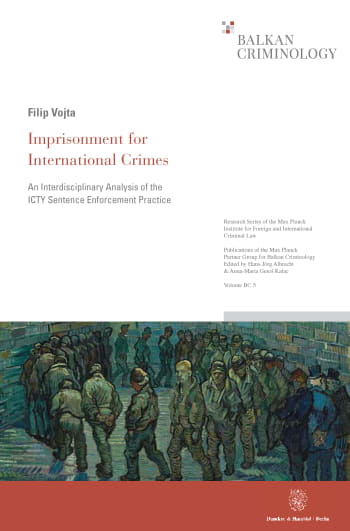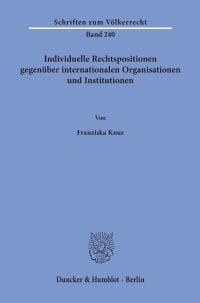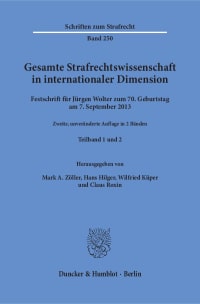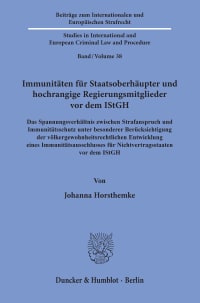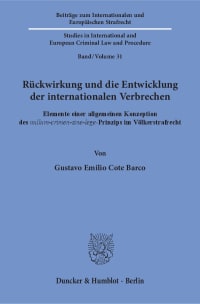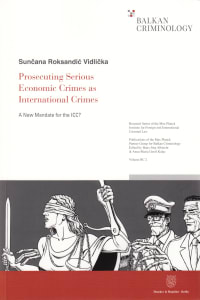An Interdisciplinary Analysis of the ICTY Sentence Enforcement Practice
Beschreibung
How criminal sentences are enforced, is of fundamental concern for the legitimacy of any justice system. However, fairly little is known about the practice of enforcing the prison sentences imposed by the international criminal tribunals.
This volume offers a unique interdisciplinary lens – including international criminal and human rights law, penology, (supranational) criminology, transitional justice and terrorism studies – through which the policy and practice of enforcing the sentences of the International Criminal Tribunal for the former Yugoslavia (ICTY) are analyzed. It is the first scientific work to comprehensively explore the significance of penal rehabilitation for the perpetrators of international crimes and its implementation in the prison treatment of the ICTY convicts.
The analysis is informed by rich and systematically collected empirical data, including indepth interviews with the ICTY/MICT officials, national prison officials, imprisoned ICTY convicts and released exprisoners. It shows comparatively – and in previously unseen detail – the trials and tribulations the practice of enforcing the ICTY sentences in different European prisons faces and offers necessary recommendations for the improvement of the vertical system for enforcement of international sentences.
Inhaltsübersicht
1. Research Questions and Methodology
Questions – Methods
2. Sentencing Practice of the ICTY in the Context of International Criminal Justice: A Preliminary Overview
International Criminal Justice and its Overarching Aims – Achieving the Overarching Aims: The Issue of Legitimacy in the ICTY’s Sentencing Practice – Summary
3. Understanding Macro-Criminality
Macro-Criminality: Etiological Delineations of International Crimes – Towards a Typology of Perpetrators – Summary
4. Rehabilitation and Macro-Criminality
Imprisonment and Human Rights: Unveiling the Concept of Rehabilitation – Archetype of the International Prison Institution: the Spandau Prison – Summary
5. The ICTY and a New System for the Enforcement of International Sentences
Basic Characteristics of the System – Consideration of Challenges for the Legitimacy of Enforcement – Summary
6.Enforcement of ICTY Sentences in Practice
General Policy on the Enforcement of ICTY Sentences – Designation of the State of Enforcement – Enforcement of ICTY Sentences in National Prisons – Evaluation
7. Summary and Suggestions for Improvement
The Hippocratic Principle: »Primum Non Nocere« – First, Do No Harm – More Transparency / More Cooperation with National Authorities in Perpetrators’Home States – Openness to Communication
References
Pressestimmen
»Imprisonment for International Crimes is an engaging and nuanced treatise, focussing on the less visible function of international war tribunals in its enforcement of sentences for war crimes. In this book, Vojta successfully makes a case for reform of that regime, which will interest scholars in criminology and law and policymakers who can lead change. Vojta’s research and dedication to this topic ensures that justice will be present and accounted for in the enforcement of international sentences. This publication will make a lasting and welcome contribution to scholarship in the area.« Lisa Silver, in: Canadian Journal of Criminology and Criminal Justice, Vol. 63, 4/2021, https://www.utpjournals.press/doi/epdf/10.3138/cjccj.63.3-4.135
»Die Praxisrelevanz der Arbeit ist hoch und liegt auf der Hand. [...] Wer künftig zu diesem Thema arbeitet, wird sich mit dieser Arbeit auseinandersetzen müssen. Das ist viel und gewiss mehr als von den meisten Dissertationen gesagt werden kann. Im Vergleich zu anderen Promotionen ragt diese Dissertation jedenfalls heraus – im Hinblick auf die Größe der Aufgabe, im Hinblick auf die Novität der Befunde und auch im Hinblick auf die kompromisslose Umsetzung des Arbeitsprogramms. Filip Vojta ist für diese Leistung die Otto-Hahn-Medaille der Max-Planck-Gesellschaft verliehen worden.« Prof. Dr. Frank Neubacher, in: Zeitschrift für Internationale Strafrechtsdogmatik, 11/2020 (www.zis-online.com)
Weitere Bücher zum Thema
Kontakt
-
+49 30 / 79 00 06 - 0
-
Bestellinformation
-
Versandkostenfrei innerhalb Deutschlands.
-
Für Kunden aus EU-Ländern verstehen sich unsere Preise inklusive der gesetzlichen Mehrwertsteuer und – außer bei digitalen Publikationen – zuzüglich Versandkosten. Für Kunden aus Nicht-EU-Ländern verstehen sich unsere Preise als mehrwertsteuerfrei und – außer bei digitalen Publikationen – zuzüglich Versandkosten.
-
-
Newsletter
